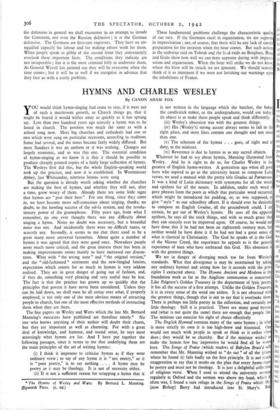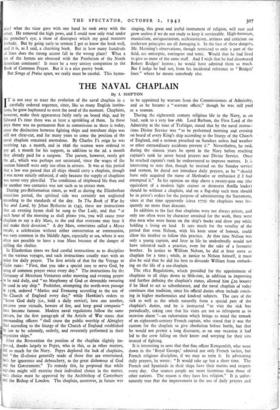HYMNS AND CHARLES WESLEY
By CANON ADAM FOX
YOU would think hymn-singing had come to stay, if it were not of such a mushroom growth, as Church things go, that it might be feared it would wither away as quickly as it has sprung up. Less than two hundred years ago scarcely a hymn was to be heard in church. The position was much the same as with a
school song now. Most big churches and cathedrals had one or two which were sung on particular occasions, according to tradition. Some had several, and the tunes became fairly widely diffused. But most Sundays it was an anthem or it was nothing. Changes are largely economic, and so was this one. The essential condition of hymn-singing as we know it is that it should be possible to produce cheaply printed copies of a fairly large collection of hymns. The Wesleys first did this, but the whole English-speaking world took up the practice, and now it is established. In Westminster Abbey, last Whitsunday, nineteen hymns were sung.
But the question is already worth asking whether the churches are making the best of hymns, and whether they will not, after a time, grow weary of them. Already there are some little signs that hymns are " past their best." For one thing, since they came in, we have become more self-conscious about singing, thanks, no doubt, to the howling success of the sol-fa system, and the revolu- tionary power of the gramophone. Fifty years ago, from what I remember, no one ever thought •there was any difficulty about singing a hymn. Noise no doubt was necessary, but a beautiful noise was not. And incidentally there were no difficult tunes, or scarcely any. Secondly, it seems to me that there used to be a great many more universal favourites. About quite a number of hymns it was agreed that they were good ones. Nowadays people seem much more critical, and the great interest there has been. in making improvements seems mainly to have increased our discon- tents. What with " the wrong tune " and " the original version," and the " old-fashioned " sentiment and the new-fangled fancies, expectation which counts for so much in hymns is very seldom realised. They are in great danger of going out of fashion, and, if they do, something very pleasing and very useful may be lost. The fact is that the practice has grown up so quickly that the principles that govern it have never been considered. Unless they can be laid down, we shall soon be all astray over what, if properly employed, is not only one of the most obvious means of attracting people to church, but one of the most effective methods of instructing them when they are there.
The fine papers on Wesley and Watts which the late Mr. Bernard Manning's execu:ors have published are therefore timely.* No one who knows anything of their author will doubt their charm, but they are important as well as charming. For with a great deal of knowledge, and humour, and sound sense, he says most arrestingly what hymns are for. And I have put together the following passages, since it seems to me that underlying them are the main principles of the art of writing hymns: (i) I think it improper to criticise hymns as if they were ordinary verse ; to say of any hymn it is " not poetry," or it is " poor poetry," is to say nothing. . . . A hymn may be poetry as it may be theology. It is not of necessity either. (ii) It is not a sufficient reason for scrapping a hymn that it
* The Hymns of Wesley and Watts. By Bernard L. Manning. (Epworth. Press. 5s. 6d.) is not written in the language which the butcher, the baker, the candlestick maker, or the undergraduate, would use today ; its object is to make these people speak and think. differently.
(iii) Wesley's obsession was with the greatest things.
(iv) His (Wesley's) strong accent always seems to fall in the right place, and most lines contain one thought and not more than one.
(v) The selection of the hymns . . . goes, of right and of duty, to the minister.
(vi) Reverence is due to hymns as to any sacred objects.
Whatever he had to say about hymns, Manning illustrated from Wesley. And he is right to do so, for Charles Wesley is the greatest of English hymn-writers. A generation ago when all good boys who aspired to go to the university learnt to compose Latin verses, we used a manual with the pretty title Gradus ad Parnassian. It was a kind of Latin dictionary with synonyms for all the words and epithets for all the nouns. In addition, under each word it gave phrases from the poets in which that particular word occurred, which might be introduced for padding, or, as • was supposed, to give " style " to our schoolboy efforts. If it should ever be desirable to compose an English Gradus, all the groundwork could, I ant certain, be got out of Wesley's hymns. He uses all the apposite epithets, he says all the stock things, and with so much grace that they can scarcely ever be improved upon. Of course, he would not have done this if he had not been an eighteenth century man, but neither would he have done it if he had not had a great sense of what is classical in Christianity. The God he speaks of is the God of the Nicene Creed, the experience he appeals to is the general experience of men who have embraced this God. His obsession is with the greatest things.
We are in danger of diverging much too far from Wesley's standards. What that divergence is may be ascertained by taking any ordinary hymnal and seeing how far it accords with the prin- ciples I extracted above. The Hymns Ancient and Modern is the foundation work as far as the Anglican communion is concerned. Like Palgrave's Golden Treasury in the department of lyric poetry, it has all the success of a first attempt. Unlike the Golden Treasury, it is in every sense of the word too artless. It is not obsessed with the greatest things, though that is not to say that it overlooks them There is perhaps too little poetry in the collection, and certainly too little theology. Still it is practical. There are many good hymns, and (what is not quite the same) there are enough that people like. The minister can exercise his right of choice effectively.
The English Hymnal contains many of the same hymns ; in what is more strictly its own it is too high-brow arid historical. One would not much wish people to speak or think as it rather often does ; they would be so churchy. But if the minister wished to make the hymns few but impressive he would find all he wants here. The Songs of Praise (which readers of Babylon Bruis'd Will
remember that Mr. Manning wished to "do out" of all the places where he found it) fails badly on the first principle. It is not much exaggeration to say that it works on the plan that every hymn must be poetry and must not be theology. It is just a delightful collection of religious verse. When I used to attend the university sermon regularly at Oxford and the sermon was above my head, which it often was, I found a sure refuge in the Songs of Praise which Mr. (now Bishop) Barry had introduced into St. Mary's. no



























 Previous page
Previous page